
<<< PREV | FIRST | NEXT >>>
There's more to being small than just being little
(High-res version over on my Patreon!)
Editor Caedere
Caedere
Colorists oniontrain &
oniontrain &  koofins !
koofins !
https://unitedhelpukraine.org/ https://www.comebackalive.in.ua/
There's more to being small than just being little
(High-res version over on my Patreon!)
Editor
 Caedere
Caedere Colorists
 oniontrain &
oniontrain &  koofins !
koofins !https://unitedhelpukraine.org/ https://www.comebackalive.in.ua/
Category Artwork (Digital) / Comics
Species Yinglet
Size 900 x 1851px
File Size 2.61 MB
That last part got me thinking, about yinglets and their brains.
Certainly, some of them are just as smart as humans. Perhaps yinglets have denser brains and/or more wrinkles to compensate for their smaller size. I'm not a biologist or anything, so this is just a guess. Dolphins have way more wrinkles than a human but it's not like you can teach them physics or even understand English as well as a human.
Certainly, some of them are just as smart as humans. Perhaps yinglets have denser brains and/or more wrinkles to compensate for their smaller size. I'm not a biologist or anything, so this is just a guess. Dolphins have way more wrinkles than a human but it's not like you can teach them physics or even understand English as well as a human.
It's not the size of the brain that matters with intellect. It's the proportion of brain to body size. Humans have proportionally more brain for their body size than any other creature on earth. Even though a whale's brain is 4 times larger than our, it's body is far larger still. This makes me think that there needs to be a certain number of brain cells per body cell it interacts with. For instance, lets say it's a ratio of 100 muscle cells per brain cell. A creature with a 100k muscle cells would need 1k brain cells, but a creature with 1k muscle cells would only need 10. Expand that same principle to every cell in the body and it results in a smaller brain, but proportionally the same size.
Basically. A Blue Whale's Brain is 4 times larger than a humans, yet their body is over 2400 times larger as well. Whales are dumb, dolphins and smaller whale's are kind of smart due to a better body to brain ratio, but big whales are pretty dumb.
Edit: This is by no means the only factor when it comes to intellect, just the one that has the biggest impact on brain size. Neuron Density and Wiring Complexity (? if that's a phrase that exists, Brain Wrinkles didn't sound as good) also play a significant factor resulting in some variation.
Edit: This is by no means the only factor when it comes to intellect, just the one that has the biggest impact on brain size. Neuron Density and Wiring Complexity (? if that's a phrase that exists, Brain Wrinkles didn't sound as good) also play a significant factor resulting in some variation.
It's probably better to talk about it as a certain size of brain per spinal cord diameter is required for "meat interface", and what's left over gets used for actual intelligence. Otherwise you wind up with the conclusion that yes, you can fit an arbitrary amount of intelligence in one cell (at the small end of the scale), or conversely can't fit it in a huge number of cells (at the big end).
I suspect if you could correct for differences in construction, you'd have to add the same amount of brain to a blue whale to get human-level smarts, in absolute terms, as subtracting from a human would result in blue whale level smarts. This may even not be all that much, considering corvids have even smaller brains.
I suspect if you could correct for differences in construction, you'd have to add the same amount of brain to a blue whale to get human-level smarts, in absolute terms, as subtracting from a human would result in blue whale level smarts. This may even not be all that much, considering corvids have even smaller brains.
I think there are a couple of important things to think about when considering this.
First is our tendency to anthropomorphize things and only consider them in terms of how we see the world.
But what is intelligence? I tend to believe that most, if not all, creatures have evolved as they are for a reason, and their minds along with this.
This is complicated by the fact that we can't really get inside the mind of another person, let alone another creature. But as time has gone on , the level of higher development of other types of beings has become more and more apparent.
We have a chauvinistic tendency to imagine ourselves as being the most intelligent and self-aware beings on the planet, or even in the universe and beyond, but just because we imagine this doesn't make it so.
At the very least there's something to be said for a level of development appropriate to a particular being. Our imagining ourselves and our level of development as being superior to that of other beings is similar to how we commonly seem to picture a God in our own image. Just because we imagine things this way doesn't mean that that's actually the way it is. There's no real reason to assume that we're superior in the way we think to any other being.
First is our tendency to anthropomorphize things and only consider them in terms of how we see the world.
But what is intelligence? I tend to believe that most, if not all, creatures have evolved as they are for a reason, and their minds along with this.
This is complicated by the fact that we can't really get inside the mind of another person, let alone another creature. But as time has gone on , the level of higher development of other types of beings has become more and more apparent.
We have a chauvinistic tendency to imagine ourselves as being the most intelligent and self-aware beings on the planet, or even in the universe and beyond, but just because we imagine this doesn't make it so.
At the very least there's something to be said for a level of development appropriate to a particular being. Our imagining ourselves and our level of development as being superior to that of other beings is similar to how we commonly seem to picture a God in our own image. Just because we imagine things this way doesn't mean that that's actually the way it is. There's no real reason to assume that we're superior in the way we think to any other being.
The misconception about intelligence and physical proportions of the brain is that larger brains equals greater intelligence, but in actuality it's neuron density that equates to intelligence. We're so intelligent, not because we have the biggest brains in the animal kingdom, but because for their size they're especially neuron-dense. The density in neurons makes it easier for plastic transformation of neural pathways to occur, and for connections to be broken and formed.
Kass could absolutely have the same level of intellect she had as a human, but clearly we're seeing that when the human Kass was transformed into a Yinglet, he had his brain radically altered to that of a female of a completely different species, and possibly even clade, than him. The human intelligence is fighting for dominance in an instinct-driven brain that only has 3 things on it: Satiation, Survival, and Sex. It's entirely possible that her brain is MUCH more neuron dense compared to most yinglets because of the transformation, and that's causing short-circuits between the two sides that want control.
One side wants to fix the issue, retain its humanity, and continue being intellectual.
The other side wants to eat, frolic, and get bent over the nearest object and absolutely fucked until it's mush.
Kass could absolutely have the same level of intellect she had as a human, but clearly we're seeing that when the human Kass was transformed into a Yinglet, he had his brain radically altered to that of a female of a completely different species, and possibly even clade, than him. The human intelligence is fighting for dominance in an instinct-driven brain that only has 3 things on it: Satiation, Survival, and Sex. It's entirely possible that her brain is MUCH more neuron dense compared to most yinglets because of the transformation, and that's causing short-circuits between the two sides that want control.
One side wants to fix the issue, retain its humanity, and continue being intellectual.
The other side wants to eat, frolic, and get bent over the nearest object and absolutely fucked until it's mush.
Some yinglets do show greater degrees of intellectual strength than others, however, that's to do with Nurture rather than Nature. Vizlet's intelligence is something that was groomed and nurtured into her, and she has been shown to starkly contrast against even the other leaders of the various clans in the fact that she is dramatically more intellectual than most of them. Furthermore, most of the yinglets in her group appear, with exceptions, to be more prone to being intellectual in general, and I firmly believe that is because Vizlet is actively promoting a form of 'standardized' and formalized education in her enclave.
This is, of course, not to say that they're not intellectual, but they are still very basal in their instincts and actions. Even Vizlet is not immune to the urge to satisfy her instincts, and even for her sex is still a thrilling prospect. She, like Kass, simply has more self control, but unlike Kass she's lived with it her whole life. Given the opportunity, Vizlet would most likely be more than happy to satisfy a suitable male with very little prodding I think.
This is, of course, not to say that they're not intellectual, but they are still very basal in their instincts and actions. Even Vizlet is not immune to the urge to satisfy her instincts, and even for her sex is still a thrilling prospect. She, like Kass, simply has more self control, but unlike Kass she's lived with it her whole life. Given the opportunity, Vizlet would most likely be more than happy to satisfy a suitable male with very little prodding I think.
Overall I'd agree with you, but I don't think we have any evidence that Vizlet or any of the other yinglet's level of intellectual ability is exclusively based on nurture. There's no reason to believe that there wouldn't be a variable degree of inherent intellectual ability, as with any creature, especially considering the outsize propensity towards variation and mutation that yinglet physiology has been shown to have.
You're confusing me talking about Ability, when I'm referring to Capacity.
It has been repeatedly, and quite clearly, demonstrated in the series that all yinglets have the capacity for higher intellectual awareness to varying degrees, this is not something that can be argued, the same as Great Apes, Felines, Corvids, and Canines can adapt to communicating with humans and by extension pass that knowledge both laterally and vertically amongst their respective species given the proper circumstances, or in exceptional circumstances across species boundaries. They have this quality by nature of their actual intelligence, this capacity is inherent irrespective of their environment or upbringing.
However, not all yinglets are observed to possess the Ability to display or properly take advantage of higher intellectual awareness. Those that do show this ability are almost exclusively in positions which lends no small amount of credibility to arguing that their intellectualism is being the result of circumstances that would be considered an exception, rather than the rule. Lopen is a very good example of this, because we saw him go from an absolute idiot who could barely comprehend the idea of 'exile' because he was on the streets and fighting for every scrap of food, to a rather thoughtful and cognizant individual who is now clearly capable of understanding complex ramifications for his actions after a couple of humans decided to sit down and talk with him. And potentially fuck his little bird brain out, but that's something I'd rather not ponder the logistics of...
This being said, as far as yinglet enclaves go we have a sample size of like... two, but one of them at least to us obviously places a greater importance on education, if only for the benefit of the humans in the neighboring city being less likely to Execute Order 66™. Are all yinglets intelligent enough to be intellectual? Yeah, with the exceptions of a few statistical outliers, definitely. Are all yinglets able to display such mental prowess without deliberate nurturing of such abilities? Probably, but I'd argue no more than that of your typical 4 to 8 year old child, which is to say the same level of intelligence as some of the smartest birds.
It has been repeatedly, and quite clearly, demonstrated in the series that all yinglets have the capacity for higher intellectual awareness to varying degrees, this is not something that can be argued, the same as Great Apes, Felines, Corvids, and Canines can adapt to communicating with humans and by extension pass that knowledge both laterally and vertically amongst their respective species given the proper circumstances, or in exceptional circumstances across species boundaries. They have this quality by nature of their actual intelligence, this capacity is inherent irrespective of their environment or upbringing.
However, not all yinglets are observed to possess the Ability to display or properly take advantage of higher intellectual awareness. Those that do show this ability are almost exclusively in positions which lends no small amount of credibility to arguing that their intellectualism is being the result of circumstances that would be considered an exception, rather than the rule. Lopen is a very good example of this, because we saw him go from an absolute idiot who could barely comprehend the idea of 'exile' because he was on the streets and fighting for every scrap of food, to a rather thoughtful and cognizant individual who is now clearly capable of understanding complex ramifications for his actions after a couple of humans decided to sit down and talk with him. And potentially fuck his little bird brain out, but that's something I'd rather not ponder the logistics of...
This being said, as far as yinglet enclaves go we have a sample size of like... two, but one of them at least to us obviously places a greater importance on education, if only for the benefit of the humans in the neighboring city being less likely to Execute Order 66™. Are all yinglets intelligent enough to be intellectual? Yeah, with the exceptions of a few statistical outliers, definitely. Are all yinglets able to display such mental prowess without deliberate nurturing of such abilities? Probably, but I'd argue no more than that of your typical 4 to 8 year old child, which is to say the same level of intelligence as some of the smartest birds.
Fun fact, large bodies require large brains to move them. So if a yinglet's brain is proportional in size to a human brain, just smaller, he may not have needed to lose anything, because changes in size and changes in brain volume is pretty comparable. Add in that one creature can have a denser neuropile, and therefore (theoretically) have more IQ per brain volume, and yinglets may technically be *smarter* than humans, at least in raw potential.
Their comparatively shorter lifespans (even when they live to old age) kinda fucks them over tho. And differences in cognition seem to make schooling, at least human-style schooling, much more difficult. If the right techniques are used, some may prove to be quick lived polymaths, but these haven't been perfected yet. And then the reputation that the species has garnered in its short and recent rise to full sapience and civilization also leaves them at a substantial disadvantage as far as obtaining the technical resources required to gain new learning. Like books.
Smaller body volume means greater heatloss and generally faster metabolism. That in general forces the heart to beat faster. That is one limit to the lifespan for sure. Not necessarily 'The' limit but an important one. A heart that beats 300 beats per minute wears out faster than one that beats 80 going by the assumed baseline of similiar cell durability.
This is one of my favorite parts of transformation stories.
These kind of physical, mental, and social questions are what makes longer form transformation themed content so fascinating.
Why does the world look different, what changes about how you interact with it, where does society put you now that you are changed, how do you think now compared to before.
These things are all extremely interesting to see explored.
These kind of physical, mental, and social questions are what makes longer form transformation themed content so fascinating.
Why does the world look different, what changes about how you interact with it, where does society put you now that you are changed, how do you think now compared to before.
These things are all extremely interesting to see explored.
Yeah, corvids don't even have the wrinkly brains that we do. Their cognition may be quite alien to our own, but they're still undeniably smart.
And then there's octopods, whose brains are *so* alien that their intelligence is that much harder to gauge, but they're just as undeniably capable of impressive cleverness *despite* a brain that can get squeezed through small cracks.
And then there's octopods, whose brains are *so* alien that their intelligence is that much harder to gauge, but they're just as undeniably capable of impressive cleverness *despite* a brain that can get squeezed through small cracks.
Fascinating study. I was reminded of the oversized tables and chairs in the Westerpark art installation in Amsterdam which were built to give full sized adults an idea of what life can be like for small children up to three years old. The giant chairs have gotten worn out by adults and tourists climbing all over them and have recently been rebuilt. (At least that is what I could gather from the text in Dutch.)
Reminds me of a memory from my childhood where I met some 5th graders as a kindergartner. They felt like giants. They were huge and towered over me.
Once I got to 5th grade, I remembered that and tried to think on when my perspective changed. Now I was one of those giants, but I didn't even notice it happened. At what point did my perspective shift? Clearly it was gradual, but I didn't notice it. And even today, nothing really feels as if it's changed. Things just feel smaller.
Once I got to 5th grade, I remembered that and tried to think on when my perspective changed. Now I was one of those giants, but I didn't even notice it happened. At what point did my perspective shift? Clearly it was gradual, but I didn't notice it. And even today, nothing really feels as if it's changed. Things just feel smaller.
A lot of this explains why I really dislike 'macro/micro' stuff at an instinctual level
Like, a lot of this is stuff I know and understand subconsciously, so seeing stuff blatantly ignore it is a kinda slightly upsetting
Also, here's hoping Kass has the good sense not to let Isher see this one.
She's got enough to be anxious about as is
Like, a lot of this is stuff I know and understand subconsciously, so seeing stuff blatantly ignore it is a kinda slightly upsetting
Also, here's hoping Kass has the good sense not to let Isher see this one.
She's got enough to be anxious about as is
Hey gang! A reminder that there's a place called "Top Web Comics" https://www.topwebcomics.com/?home=3 that compiles comics from various places. There's a bunch of cool stuff there. They have monthly votes, so you can support OOPs there. You can vote once a day per device, so your PC, laptop, tablet, phone, etc.
I've noticed that you can sometimes even get in extra votes from different IP addresses, or if you're disconnected from your IP and open up again later.
Oops has been slowly climbing in the ranks, and closed out last month at 45th place and about 1065 votes. It's currently at 956 votes and 42nd place. The top vote getters seem to end up with something close to 20,000 votes.
Today is the last day to vote for this month. Let's push it!
Vote early, vote often! Help OOPs get noticed!
I've noticed that you can sometimes even get in extra votes from different IP addresses, or if you're disconnected from your IP and open up again later.
Oops has been slowly climbing in the ranks, and closed out last month at 45th place and about 1065 votes. It's currently at 956 votes and 42nd place. The top vote getters seem to end up with something close to 20,000 votes.
Today is the last day to vote for this month. Let's push it!
Vote early, vote often! Help OOPs get noticed!
There are really subtle hints throughout the story. Jordan likes to use history to influence the story. The whole theme of the wheel keeps turning. The show on Amazon, if you look at the mining town Rand and Matt stop in, they are not mining minerals... They are digging out ruins of a dump for "artifacts" of what was a landfill. Even in the beginning, you see them overlooking the city that was overgrown. At the 3:45 minute point https://www.youtube.com/watch?v=bspJ_5xsFq4
lol funny you actually considered the compressed brain thing. that too is a thing that made me curious and bothered me in the back of my mind; though it's easy to hand-wave away as "it's just magic, or technology so beyond our understanding it might as well be" it's still something that makes the sci-fi nerd in me want to explain lol. my first guess was I know the brain is highly redundant in some ways vs something like a hard-drive, so whatever changed them was likely so complex & precise, it could instantly figure out which neurons were redundant and somehow excise or compress them. Alternatively I and many other people might be short selling yinglet's neurological power; the core biology of their neurons might actually be superior to that of a human pound for pound and even match or exceed human intellect due to this, but due to their physical disadvantages have rarely been able to come close to meeting, thus 0 data loss at having one's neurons transcribed onto yinglet neurons.
lol or maybe it's like "fallout new Vegas" and their actual brain is like, in a pocket dimension right now. Now I'm kind of wondering if there is anything else the artifact did to them that just takes a certain stimulus to trigger or something. I mean maybe not "Kass is now a shonen protagonist" type of benefit, but at least being able to interact with the ancient tech in ways no other known being can?
lol or maybe it's like "fallout new Vegas" and their actual brain is like, in a pocket dimension right now. Now I'm kind of wondering if there is anything else the artifact did to them that just takes a certain stimulus to trigger or something. I mean maybe not "Kass is now a shonen protagonist" type of benefit, but at least being able to interact with the ancient tech in ways no other known being can?
Nah, according to the "intelligence is proportional to body/brain ratio" theory, you don't actually need a big brain to be smart. Presumably most of it is implementing filtering of incoming body-internal signals and fanout of outgoing signals, and to get human-level intelligence you only need a tiny sliver. It's just that because evolution is a blind watchmaker, that sliver is really, really, really spread out.
Not entirely wrong: brains are quite resistant to neurons dying, partly by having a lot of spare capacity (but if human-built systems are any guide, nothing's really copy-pasted). True I wasn't referring to it though. But it probably is a factor; you can survive a surprising amount of brain damage without much loss because brains can learn to use the remaining neurons to do the job of the ones that died. Transformation magic could probably do much better.
Val...Why do you need to get so DEEP with this stuff man?! Like holy crap!.. I’m a rat furry...Think about how much less brain mass I’d have in feral form, if I weren’t a Skaven Brood Queen...
This kind of stuff is both fascinating and blood scary as fuk to think about!
xD
Never stop!!
This kind of stuff is both fascinating and blood scary as fuk to think about!
xD
Never stop!!
It's not at all true in the way that, eg, just sitting at the desktop uses less than 10% of your graphics card. GPUs are a prime example of something where that kind of metric does make sense (being the same basic submodule copy-pasted a lot), while a lot of the things brains do are localised to a particular area and if you lose that bit of brain you have trouble with that particular thing unless your brain can adapt to have other parts take over.
It wouldn't even have to be a bad acid trip. LSD and similar psychedelics cause the random firings of neurons.
I know from my personal experience with acid and psilocybin that one of the main effects of a "Trip" of a sufficient dosage is a feeling of being overstimulated and overwhelmed by a combination of sensory stimuli and random or semi-random connections being made by ones mind. It's a distinct sense of your brain working at many times its typical pace and level of connection.
I know from my personal experience with acid and psilocybin that one of the main effects of a "Trip" of a sufficient dosage is a feeling of being overstimulated and overwhelmed by a combination of sensory stimuli and random or semi-random connections being made by ones mind. It's a distinct sense of your brain working at many times its typical pace and level of connection.
Welp, Kass is technically correct, though it's the weight that really matters, and weight gets exponentially greater with size.
Big creatures need to move relatively more slowly because they have to support a LOT of weight, while small creatures can move blindingly fast. It's also why cats and small animals can fall from high heights without getting injured while humans would break their bones for just a 2 meters fall.
Big creatures need to move relatively more slowly because they have to support a LOT of weight, while small creatures can move blindingly fast. It's also why cats and small animals can fall from high heights without getting injured while humans would break their bones for just a 2 meters fall.
You can have severe hydrocephalus and have high IQ:
https://www.irishtimes.com/news/rem.....rain-1.1026845
https://www.irishtimes.com/news/rem.....rain-1.1026845
Re: Intelligence:
The way the human brain works is that it has many (relatively) sparse neural networks working on problems in parallel.
Networks that expect a stimuli to not be relevant to them stop processing it and return to idle.
Networks that think a stimuli is relevant to them process the input, then have a 'vote' to determine which network(s) have the best results, and pass those results on to the next stage of processing.
This structure *appears* to be the standard, but this is a new field of research so there's a lot of uncertainty.
We *think* this developed for energy conservation - using the entire brain all the time would consume so much energy that it'd basically be impossible to avoid starving, so it's really useful to be able to shut off entire lines of processing when they wouldn't help. (Neural network research is exploring in this direction - See Google's Minerva AI. This doesn't cull pathways, yet, but it does vote for best results.)
Anyway, long explanation short the end result of this is that instead of a loss of mass leading to forgetting how to do something, you can simply degrade the quality of the results. More pertinently, that decrease could be in the form of pruning pathways based on how often they're used - which is something brains do anyway.
The way the human brain works is that it has many (relatively) sparse neural networks working on problems in parallel.
Networks that expect a stimuli to not be relevant to them stop processing it and return to idle.
Networks that think a stimuli is relevant to them process the input, then have a 'vote' to determine which network(s) have the best results, and pass those results on to the next stage of processing.
This structure *appears* to be the standard, but this is a new field of research so there's a lot of uncertainty.
We *think* this developed for energy conservation - using the entire brain all the time would consume so much energy that it'd basically be impossible to avoid starving, so it's really useful to be able to shut off entire lines of processing when they wouldn't help. (Neural network research is exploring in this direction - See Google's Minerva AI. This doesn't cull pathways, yet, but it does vote for best results.)
Anyway, long explanation short the end result of this is that instead of a loss of mass leading to forgetting how to do something, you can simply degrade the quality of the results. More pertinently, that decrease could be in the form of pruning pathways based on how often they're used - which is something brains do anyway.
Smaller body, lighter processor load to run all the systems and process all the telemetry, so you can get away with less brain meats? The brain does a lot that the conscious mind isn't really aware of.
As for the rest, the brain also uses a lot of shortcuts in how that processing works, assumptions that work well enough most of the time. Optical illusions and cognitive biases are examples of this, what you expect can also have a large impact on your perceptions, and the human brain is so heavily tuned for spotting shapes and patterns that it constantly gives false positives(the tiger you don't spot might kill you but the one you imagine probably won't).
Maybe yinglet brains have more of these "good enough" optimizations to help make do with fewer neurons?
As for the rest, the brain also uses a lot of shortcuts in how that processing works, assumptions that work well enough most of the time. Optical illusions and cognitive biases are examples of this, what you expect can also have a large impact on your perceptions, and the human brain is so heavily tuned for spotting shapes and patterns that it constantly gives false positives(the tiger you don't spot might kill you but the one you imagine probably won't).
Maybe yinglet brains have more of these "good enough" optimizations to help make do with fewer neurons?
This. This is why I watch you. You're actually thinking this stuff through and presenting the results to us. There ain't enough "furry" fiction like this out there, even in comics. If there's more stuff like this out there, I hope I can find it, or someone will tell me. Sometimes, it feels like the only furry fiction out there is badly written porn, and it depresses me.
Where's my awesome fiction starring fuzzy non-humans, dang it!!!
Where's my awesome fiction starring fuzzy non-humans, dang it!!!
Much the same is true for larger creatures. everything is too small and undersized.
It can be a task to avoid the smaller creatures that wonder underfoot unexpectedly and unseen.
this is why there's a general rule why do don't come within x range of a larger creature while they are standing, you are likely to get trampled :/
This is the way of life. and only one of the differences between them.
It can be a task to avoid the smaller creatures that wonder underfoot unexpectedly and unseen.
this is why there's a general rule why do don't come within x range of a larger creature while they are standing, you are likely to get trampled :/
This is the way of life. and only one of the differences between them.
I'm going to share some of what I've been researching over time, in case no one has told you yet, Valsalia. Maybe you already know this but you here were playing a character who lives in a world where all this is still unknown. I will talk more than anything about brains and intelligence.
I have seen that others have already commented on the relationship between the relative size between the brain and the rest of the body of an individual. This is called the "encephalization coefficient", but it is obviously not the only factor, but it is relevant. Also very important is the "neural density" and the number of neurons that exist in the cerebral cortex (which is the most developed/evolved area of exclusively mammalian brains, and where the most complex thoughts are processed).
Due to the scaling laws that govern the sizes of the world, the volume increases and decreases 8 times for each time the surface is doubled or halved. Then, the greater the size of an individual, the number of neurons exclusively responsible for coordinating and controlling the movements of that body increases exponentially (this is why the encephalization coefficient is important). On the other hand, neural density refers to the number of neurons that exist in a given amount of space. Bottlenose dolphins, for example, have a very high encephalization coefficient (although a bit less than humans) and a brain of a larger absolute size than the human brain... but the neural density of dolphin brains is less than human. Another very noteworthy example are the crows, specifically the New Caledonian crows, which have been determined by studies that compare in intelligence to elephants, dolphins and chimpanzees; an intelligence comparable to a human child between 5 and 7 years of age is estimated. Their brains have been studied and despite being tiny... they have almost twice the number of neurons than the brains of monkeys of the same size and brain weight. It is especially surprising because birds followed a different evolutionary path and therefore did not develop the cerebral cortex like mammals but have a similar structure although more primitive than the cortex (pallium) but in the case of crows that structure is much more developed.
In conclusion, a creature can possess the same intelligence as a human despite being much smaller in size. What you need is to have a greater neural density carried along with the reduced size. It may even be possible that a creature 60 centimeters tall possesses human-like intelligence and a well-adapted and functional body (unlike the cases that small sizes are due to genetic diseases, because in this regard there have been humans who measured only 65 centimeters (2'1 ft)). Right now I'm imagining some species of intelligent and civilized rats that measure 60 centimeters or even less, but the smaller their heads in relation to their bodies, the greater their neural density must be. But it would not be good to abuse the neural density since the most certain thing is that the neural density can increase up to a certain limit.
There was a race of humans (homo sapiens) pygmies whose adults measured only 1 meter (3 ft), their heads were just a little smaller than those of normal humans, an almost negligible difference, this made those pygmies have larger heads than would be proportionally normal for their human bodies. But those were humans, separated by a very short evolutionary time, which is why they shared the same neural density as humans and that could not vary with such a short evolutionary time difference... therefore, to maintain intelligence at the human level, the coefficient of encephalization was what had to be increased, leaving the head the same size despite the fact that the body was reduced to slightly more than half the "normal" size.
First of all, the concept of the world made up of very small objects is already quite a revolutionary idea. But it is true that since the times of the ancient Greeks this idea was reached simply by deductive reasoning (it cannot be said that the Greek sages were scientists or did science, but they were impressively good at intuition and deductive logical reasoning). But they didn't talk about "molecules", the term molecules is very modern, the first time this concept came up was from Leucippus but it was just his apprentice Democritus who developed the idea and gave the elementary particles a name: "atoms", and the same word reveals this origin to you since its etymology (a/tom) refers to the non-divisible, so small that it cannot be separated, the smallest portion of matter.
Before that, and for a long time after, despite the ideas about atoms, the idea of matter made up of elements (water, fire, earth, air, and ether) remained very popular among wise men and scholars. This conceptualization had its complexity and its theories, added over the years and thinkers who believed in it, came to be in force even very late in modernity, supported by alchemists who already studied the stars and said that they were composed of ether. It was not until 1803 with John Dalton that the nature of atoms and matter was scientifically defined.
I have seen that others have already commented on the relationship between the relative size between the brain and the rest of the body of an individual. This is called the "encephalization coefficient", but it is obviously not the only factor, but it is relevant. Also very important is the "neural density" and the number of neurons that exist in the cerebral cortex (which is the most developed/evolved area of exclusively mammalian brains, and where the most complex thoughts are processed).
Due to the scaling laws that govern the sizes of the world, the volume increases and decreases 8 times for each time the surface is doubled or halved. Then, the greater the size of an individual, the number of neurons exclusively responsible for coordinating and controlling the movements of that body increases exponentially (this is why the encephalization coefficient is important). On the other hand, neural density refers to the number of neurons that exist in a given amount of space. Bottlenose dolphins, for example, have a very high encephalization coefficient (although a bit less than humans) and a brain of a larger absolute size than the human brain... but the neural density of dolphin brains is less than human. Another very noteworthy example are the crows, specifically the New Caledonian crows, which have been determined by studies that compare in intelligence to elephants, dolphins and chimpanzees; an intelligence comparable to a human child between 5 and 7 years of age is estimated. Their brains have been studied and despite being tiny... they have almost twice the number of neurons than the brains of monkeys of the same size and brain weight. It is especially surprising because birds followed a different evolutionary path and therefore did not develop the cerebral cortex like mammals but have a similar structure although more primitive than the cortex (pallium) but in the case of crows that structure is much more developed.
In conclusion, a creature can possess the same intelligence as a human despite being much smaller in size. What you need is to have a greater neural density carried along with the reduced size. It may even be possible that a creature 60 centimeters tall possesses human-like intelligence and a well-adapted and functional body (unlike the cases that small sizes are due to genetic diseases, because in this regard there have been humans who measured only 65 centimeters (2'1 ft)). Right now I'm imagining some species of intelligent and civilized rats that measure 60 centimeters or even less, but the smaller their heads in relation to their bodies, the greater their neural density must be. But it would not be good to abuse the neural density since the most certain thing is that the neural density can increase up to a certain limit.
There was a race of humans (homo sapiens) pygmies whose adults measured only 1 meter (3 ft), their heads were just a little smaller than those of normal humans, an almost negligible difference, this made those pygmies have larger heads than would be proportionally normal for their human bodies. But those were humans, separated by a very short evolutionary time, which is why they shared the same neural density as humans and that could not vary with such a short evolutionary time difference... therefore, to maintain intelligence at the human level, the coefficient of encephalization was what had to be increased, leaving the head the same size despite the fact that the body was reduced to slightly more than half the "normal" size.
First of all, the concept of the world made up of very small objects is already quite a revolutionary idea. But it is true that since the times of the ancient Greeks this idea was reached simply by deductive reasoning (it cannot be said that the Greek sages were scientists or did science, but they were impressively good at intuition and deductive logical reasoning). But they didn't talk about "molecules", the term molecules is very modern, the first time this concept came up was from Leucippus but it was just his apprentice Democritus who developed the idea and gave the elementary particles a name: "atoms", and the same word reveals this origin to you since its etymology (a/tom) refers to the non-divisible, so small that it cannot be separated, the smallest portion of matter.
Before that, and for a long time after, despite the ideas about atoms, the idea of matter made up of elements (water, fire, earth, air, and ether) remained very popular among wise men and scholars. This conceptualization had its complexity and its theories, added over the years and thinkers who believed in it, came to be in force even very late in modernity, supported by alchemists who already studied the stars and said that they were composed of ether. It was not until 1803 with John Dalton that the nature of atoms and matter was scientifically defined.
Oh definitely! Encephalization is a concept that's interested me for a long time, especially in corvids. And yeah; something that's both a core component of this comic, as well as a fun challenge, is making these early scientific document sorts of entries, based on the limited knowledge and research methods available at this period in history and scientific development.
Glad you're finding this interesting, and thanks for the detailed writeup! : D
Glad you're finding this interesting, and thanks for the detailed writeup! : D

 FA+
FA+


























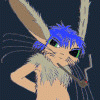












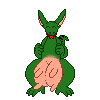










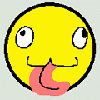
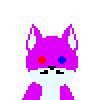
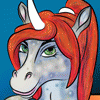

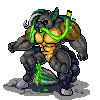







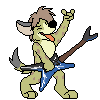


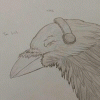























Comments